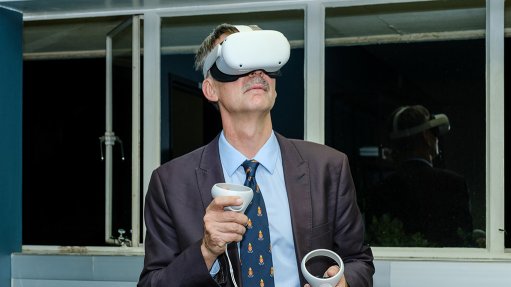Climate uncertainty threatens water security
Apart from water infrastructure related challenges, the reliability of South African water supplies is threatened by increasing climate uncertainty.
“For a country such as ours, water supply infrastructure developed organically over time, in step with population growth, reliable (if variable) rainfall, and availability of economically favourable projects. Although our average annual rainfall is much lower than the international average, geography enabled the development of many grand surface water schemes,” says professional engineering company Water Globe Consultants VP Gisela Kaiser.
She explains, however, that the assurance of supply needs to be reconsidered as climate variability escalates. The increase in unprecedented drought and flood events will also inevitably lead to increased budget requirements.
Providing sufficient water to meet growing demand requires a continuous income stream, both to operate existing, and to develop new, infrastructure. A National Water Pricing Strategy, finalised in 2007, provides for cost-reflective water tariffs to be charged.
The tariffs must cover the overall total cost of providing water and sanitation services, and equitably distribute these across residential and non-residential users. With increasing risk of supply failure, costs are expected to increase. However, there are limits to affordability and dramatic tariff increases encourage business to go off-grid, thus eroding the revenue base.
Government departments already claim to have insufficient budget available to fulfil their mandates – both in providing new infrastructure and in maintaining and operating the existing infrastructure.
The rapid growth and development in the second half of the 1900s resulted in a comprehensive infrastructure network, designed to last many decades. Pro-active maintenance ensures longevity of such networks but is easily deferred to future budgets as soon as priorities compete. While maintenance costs naturally increase over time, where maintenance is neglected, the investment required to fix infrastructure increases exponentially.
Owing to water infrastructure damage or failure not being easily visible, problems are seldom addressed until the need is acute and they become an emergency. The government, and municipalities, need to prioritise water infrastructure and sustainable supplies to prevent future water shortages.
“There are currently 278 municipalities in South Africa, of which eight are metropolitan and 226 are local municipalities. The size, budget and technical resources vary greatly from one to the next municipality,” explains Kaiser.
She highlights that many municipalities do not have the capacity to deliver services or generate the necessary revenue to operate a functional administration. Regulations applicable to local government are administratively burdensome and while well-intended, these regulations are resource-heavy in pursuit of compliance.
In the 2019 financial year, less than 8% of municipalities had clean audits and the situation is unlikely to change as many municipalities do not have the resources to improve. Municipal structures have to be “fundamentally restructured, to provide more practical and achievable governance systems rather than the current out-of-reach aspirational models”.
For example, to alleviate the administrative pressure on municipalities, infrastructure needs to be addressed separately from goods and services in procurement policies. “Municipalities currently use the same procurement system for the purchase of drinking glasses as for desalination plants. In addition, policies and systems need to accommodate differences and unique needs in various municipalities.”
An integrated and collaborative approach is required in resolving infrastructure-related challenges to provide sufficient, reliable and safe water and sanitation services.
“We need to focus on implementation rather than just monitoring. Fair wages need to be paid for fair work. We need to fix root causes rather than stick on band-aids to get through a financial year or term of office. We need further collaboration and cooperation, not just amongst engineers, but especially with government, and all water users.”
She concludes by noting that national government budgeting needs to show that it understands the critical importance of water and sanitation infrastructure. “There are so many competing demands in the country, but basic services must be prioritised before funding nice-to-haves.”
Comments
Press Office
Announcements
What's On
Subscribe to improve your user experience...
Option 1 (equivalent of R125 a month):
Receive a weekly copy of Creamer Media's Engineering News & Mining Weekly magazine
(print copy for those in South Africa and e-magazine for those outside of South Africa)
Receive daily email newsletters
Access to full search results
Access archive of magazine back copies
Access to Projects in Progress
Access to ONE Research Report of your choice in PDF format
Option 2 (equivalent of R375 a month):
All benefits from Option 1
PLUS
Access to Creamer Media's Research Channel Africa for ALL Research Reports, in PDF format, on various industrial and mining sectors
including Electricity; Water; Energy Transition; Hydrogen; Roads, Rail and Ports; Coal; Gold; Platinum; Battery Metals; etc.
Already a subscriber?
Forgotten your password?
Receive weekly copy of Creamer Media's Engineering News & Mining Weekly magazine (print copy for those in South Africa and e-magazine for those outside of South Africa)
➕
Recieve daily email newsletters
➕
Access to full search results
➕
Access archive of magazine back copies
➕
Access to Projects in Progress
➕
Access to ONE Research Report of your choice in PDF format
RESEARCH CHANNEL AFRICA
R4500 (equivalent of R375 a month)
SUBSCRIBEAll benefits from Option 1
➕
Access to Creamer Media's Research Channel Africa for ALL Research Reports on various industrial and mining sectors, in PDF format, including on:
Electricity
➕
Water
➕
Energy Transition
➕
Hydrogen
➕
Roads, Rail and Ports
➕
Coal
➕
Gold
➕
Platinum
➕
Battery Metals
➕
etc.
Receive all benefits from Option 1 or Option 2 delivered to numerous people at your company
➕
Multiple User names and Passwords for simultaneous log-ins
➕
Intranet integration access to all in your organisation





















